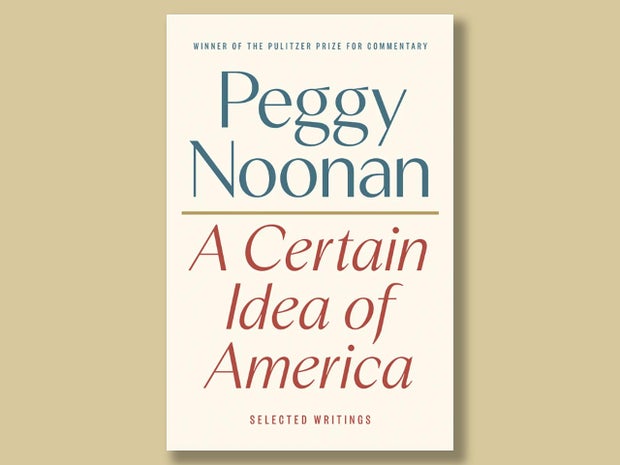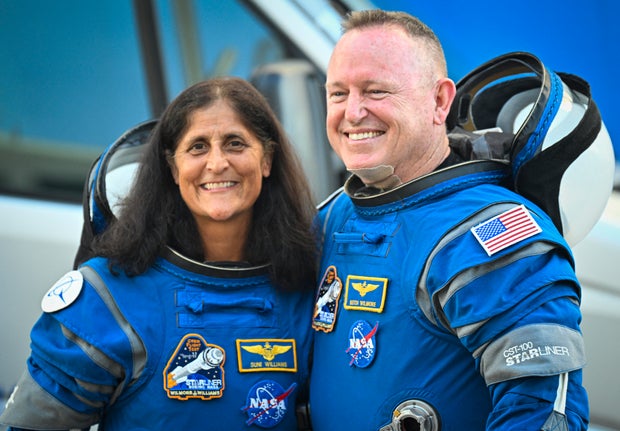CBS News
Book excerpt: “A Certain Idea of America” by Peggy Noonan

Portfolio
We may receive an affiliate commission from anything you buy from this article.
In her new collection of columns from the Wall Street Journal, “A Certain Idea of America” (to be published November 19 by Portfolio), Pulitzer Prize-winner Peggy Noonan writes about the history and character of our nation, the remarkable figures who personify the best of America, threats to the social fabric, and the “better angels” of our democracy.
Read the foreword below, and don’t miss Robert Costa’s conversation with Peggy Noonan on “CBS Sunday Morning” November 17!
“A Certain Idea of America” by Peggy Noonan
Prefer to listen? Audible has a 30-day free trial available right now.
Foreword
This is not a book about the day to day of our national political life. It is simply about loving America and enjoying thinking aloud about it.
The columns gathered here are varied in terms of subject matter. They are about the things that endure, and things that deserve to be encouraged. A number of them are about spectacular human beings. As my editor and I read through the past few years of Wall Street Journal columns, if I said, “I really enjoyed writing that,” or she said, “I loved this,” or I said, “This was important to me,” it was in. If not, out. We chose about eighty from more than four hundred. We found ourselves most attracted to themes of history and its pleasures.
The book is divided into seven parts.
“Let Us Now Praise Famous Men” is mostly about great figures and artists of the twentieth century, from Billy Graham to Oscar Hammerstein, from Queen Elizabeth II to Senator Margaret Chase Smith of the state of Maine, and from Tom Wolfe to Bob Dylan, with some side trips to the nineteenth century and the generals of the American Civil War. Looking back on a career of now fifty years, I see that from the beginning what I have loved most, what has most moved me, is writing honest praise.
“I Don’t Mind Being Stern,” on the other hand, is about having fun, as a public writer, taking as big a stick as you can to people and things you are certain deserve it. The U.S. Senate changing its dress code to accommodate a senator who enjoys dressing like a child? Get the stick. Vengeful Prince Harry? Ditto. We were certain a recent Broadway production of Cabaret deserved our stern attention, in a piece whose last line is its summation: “Life Isn’t Merde.” We castigate men who aren’t gentlemen, and admonish parents who, as their personal vanity product, wind kids up to become mindless status robots. Also receiving fire are woke academics who speak garbage thoughts with garbage words. (I am sorry to use the word “woke,” which is boring and sounds merely sarcastic, but the thing is that when you say it, everyone pretty much knows what you mean.) I believe we were the first to compare contemporary social justice warriors with the practitioners of the struggle sessions of the Chinese Cultural Revolution. We enjoyed pointing out that the leaders of the French Revolution were, largely, sociopaths. There’s a piece written in the hours after January 6, 2021.
In “Try a Little Tenderness” we turn to love, which we posit as a very good thing. We call for artists to enter politics. We meditate, after the fire that swept the Cathedral of Notre Dame, in Paris, on the enduring presence and power of religious faith. We unabashedly love, we swoon over and wish to marry, Leo Tolstoy and War and Peace. We mourn for Uvalde, Texas. We talk about the endless drama of men and women, and instruct America that more happens every day in the office than business. Also we declare Taylor Swift an American phenomenon, and if you don’t like it you can just shake it off.
“It Appears He Didn’t Take My Advice” is two columns long. The first, on Joe Biden, was so spectacularly wrong in its central prediction that it made us laugh. Yet looking back five years, it seemed to me in its reasoning to be still oddly pertinent. The second, on Donald Trump, on the eve of the 2016 election, seems to me to have some prescience as to his central problems as a historical figure. Also in the writing of it I remember a feeling of poignance.
“On America” is about the foibles, troubles, and triumphs of our country. It includes the story of my great-aunt Jane Jane, and how, as an Irish immigrant, she came to love her new country. I’d say the general theme of this section is about keeping your poise under pressure. It includes recent college graduates, the Normandy invasion, and the spirited, against-the-grain testimony of an old-fashioned capitalist. Also included, a portrait of the dynamics that produced a political sea change: “The Protected Versus the Unprotected.”
“Watch Out” contains columns about the worries that preoccupy my mind: the dark potentials of AI, skepticism as to the character and motives of its inventors; the possible use of nuclear weapons, and the ongoing dramas in Ukraine and the Mideast.
“We Can Handle It” is about working our way, as a nation, through things that roil us, from the #MeToo movement to the abortion wars, from the creation of a sane foreign policy, to the low state of the American presidency.
This collection draws its title from the famous first sentence of Charles de Gaulle’s “War Memoirs,” most happily translated as “All my life I have had a certain idea of France.” It struck me when I read it many years ago and stayed with me because all my life I have had a certain idea of America, and from the beginning it shaped my thinking and drove my work.
What is that idea? That she is good. That she has value. That from birth she was something new in the history of man, a step forward, an advancement. Its founders were engaged in the highest form of human achievement, stating assumptions and creating arrangements whereby life could be made more: just. In the workings of its history I saw something fabled. The genius cluster of the Founders, for instance—how did it happen that those particular people came together at that particular moment with exactly the right (different but complementary) gifts? Long ago I asked the historian David McCullough if he ever wondered about this. He said yes, and the only explanation he could come up with was: “Providence.” That is where my mind settles, too.
De Gaulle said his thoughts on France were driven as much by emotion as reason, and the same for me. A piece in here dated July 3, 2019, speaks of both:
I’m not really big on purple mountain majesties. I’d love America if it were a hole in the ground, though yes, it’s beautiful. I don’t love it only because it’s “an idea,” as we all say now. That strikes me as a little bloodless. Baseball didn’t come from an idea, it came from us—a long cool game punctuated by moments of high excellence and utter heartbreak, a team sport in which each player operates on his own. The great movie about America’s pastime isn’t called Field of Ideas, it’s called Field of Dreams. And the scene that makes every grown-up weep is when the dark-haired young catcher steps out of the cornfield and walks toward Kevin Costner, who suddenly realizes, That’s my father.
He asks if they can play catch, and they do, into the night.
The great question comes from the father: “Is this Heaven?” The great answer: “It’s Iowa.”
Which gets me closer to my feelings on patriotism. We are a people that has experienced something epic together. We were given this brilliant, beautiful thing, this new arrangement, a political invention based on the astounding assumption that we are all equal, and that where you start doesn’t dictate where you’ll wind up. We’ve kept it going, father to son, mother to daughter, down the generations, inspired by the excellence and in spite of the heartbreak. Whatever was happening, depression or war, we held high the meaning and forged forward. We’ve respected and protected the Constitution.
And in the forging through and holding high we’ve created a history, traditions, a way of existing together.
We’ve been doing this for 243 years now, since the first Fourth of July and in spite of all the changes that have swept the world.
It’s all a miracle. I love America because it’s where the miracle is.
I would say of the above, welcome to my deepest heart.
You’ll see some of the U.S. Civil War here. It has been a lifelong preoccupation and followed my interest in Abraham Lincoln, whose life has gripped me since childhood. He is the only American president who was both a political and literary genius—literally, genius—and about him clung an air of the mystical. He was completely human (homely ways, off-color jokes, depressions, a writer of angry letters) and yet there was something almost supernatural in his ability to be fair, to be just, to be merciful toward his tormentors (the angry letters were thrown in a drawer). What a figure. Tolstoy thought him the greatest man in history.
Religious faith is a constant subtext here because it’s my constant subtext.
Anyway, America. With all her harrowing flaws (we have always been a violent country, for instance) she deserves from us a feeling of profound protectiveness. Our great job as citizens is to shine it up a little, make it better, and hand it on, safely, to the generation that follows, and ask them to shine it up and hand it on. I think that is often what I was trying to do. When you see this I will have been a weekly columnist in The Wall Street Journal for just shy of a quarter century. I am grateful I haven’t run out of opinions.
Excerpted from “A Certain Idea of America” by Peggy Noonan, in agreement with Portfolio, an imprint of Penguin Publishing Group, a division of Penguin Random House LLC. Copyright © 2024 Peggy Noonan.
Get the book here:
“A Certain Idea of America” by Peggy Noonan
Buy locally from Bookshop.org
For more info:
CBS News
Why NASA delayed the return date for Starliner astronauts still in space

Watch CBS News
Be the first to know
Get browser notifications for breaking news, live events, and exclusive reporting.
CBS News
How a French woman found out her husband, strangers were abusing her

Watch CBS News
Be the first to know
Get browser notifications for breaking news, live events, and exclusive reporting.
CBS News
Why are astronauts stuck in space? Here’s how the Boeing Starliner crew ended up on the space station for months.

Two NASA astronauts who flew up to the International Space Station in a Boeing Starliner capsule for a round trip that was supposed to last just over a week will be stuck in space for closer to a year before they can come home. Despite the astronauts’ longer-than-expected stay at the space station, officials have insisted that Suni Williams and Butch Wilmore aren’t stranded in space.
Here’s what we know about the stuck astronauts:
Why are the astronauts stuck in space?
Williams and Wilmore blasted off to the space station in June. Their mission was supposed to take between eight and 10 days, but helium leaks in the capsule’s propulsion system and degraded thrusters, which are important for re-entry, upended plans for bringing the astronauts back to Earth.
“Eight days to eight months or nine months or 10 months, whatever it is, we’re going to do the very best job we can do every single day,” Wilmore told CBS News correspondent Mark Strassmann in September. At the time, they were expected to leave the space station in late February 2025.
The capsule safely returned to Earth in September with no one onboard.
Who are the astronauts who are stuck in space?
Williams turned 59 on the space station in September. She joined NASA in 1998 after serving in the Navy for over a decade, retiring as a captain. As a naval aviator, she logged over 3,000 flight hours in more than 30 different aircraft. At NASA, she had set a record for women with four spacewalks lasting a total of 29 hours, 17 minutes, but it was broken by Peggy Whitson with her fifth spacewalk in 2008.
Wilmore also retired from the Navy as a captain, recording over 8,000 flight hours as a naval aviator. During Operation Desert Storm in Iraq in 1991, Wilmore flew 21 combat missions. He joined NASA in 2000 and accumulated 178 days in space before the Starliner mission. Like Williams, he has also performed four spacewalks, totaling 25 hours, 36 minutes.
Miguel J. Rodriguez Carrillo/AFP via Getty Images
Why did the Boeing Starliner crew go to the International Space Station in the first place?
The June launch was the Starliner’s first piloted test flight. NASA has funded the development of the capsule and SpaceX’s Crew Dragon as the space agency looks to stop using Russian Soyuz flights to transport astronauts to and from the space station.
When will the astronauts be able to return to Earth?
On Tuesday, Dec. 17, NASA announced Williams and Wilmore would return to Earth after the agency’s new SpaceX crew arrives at the space station. That won’t happen until late March at the earliest so NASA and SpaceX can have more time to finish a new Dragon spacecraft for the mission, NASA said.
Have other astronauts been stuck in the International Space Station before?
NASA astronaut Frank Rubio and two cosmonauts’ six-month stay on the space station was unexpectedly extended to a year after their Soyuz ship became disabled. A replacement had to be launched up to the trio so they could return to Earth in 2023.
contributed to this report.




